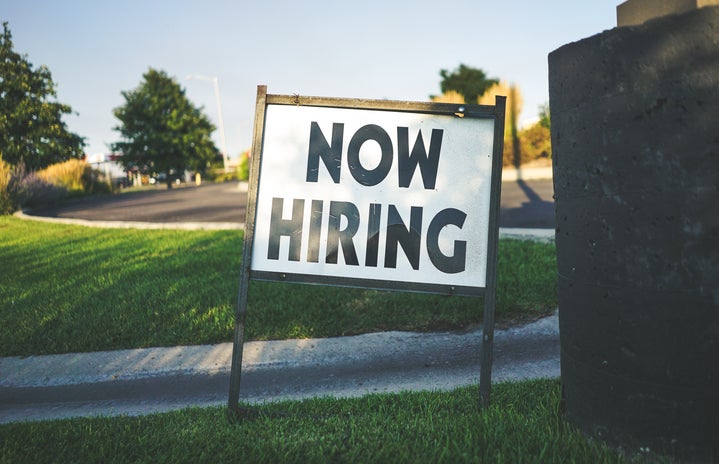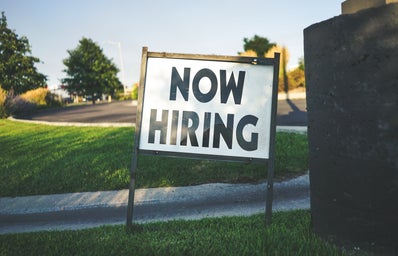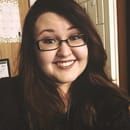Coming into college, I, like a lot of others, had to face certain aspects of my identity I had hidden. My INTS 101 Narratives of Identity course essentially forced me to face these and even present on them, so there was no way I was avoiding these aspects that I had hidden for so long. Halfway through my speech, I found myself bawling at these identities I never truly reconciled with. Thank goodness that Sharrell, she prefers us to call her by her first name to set us all as equals in the learning environment, is very understanding and instead of feeling ashamed I felt comfortable in confiding to her and growing with her. Hearing snippets of her background and life already intrigued me and I quickly deemed her one of the strongest people I had ever encountered. In my eyes, she was so resilient and just strong. Her inspiring story helped expand my perspective and motivation in obtaining a college education, which I felt needed to be shared with countless collegiettes that might need the help as well. I interviewed her for the Mason profile because I feel her story, perspective and her cause needs to be shared.
You’ve shared some parts of your past and current life in class, could you describe them further?
SHG: “Right now I am a full-time Ph.D. student finishing my last semester of classes. I am a wife and a new mother, but my miracle baby surprised us in the midst of getting my Ph.D. We were actually planning on adopting after I received it because I have had trouble with pregnancy… and include this… I know the black women having fertility issues is not the narrative, it is mainly the stereotype that black women have too many kids too often to take advantage of the system… But I had fertility difficulties, which was hard for me to come to terms with. I even had a miscarriage which resulted in me almost “bleeding out.” I almost did not make it, a severity I was not aware of until after the emergency surgery. At 35 I lost my mom to two types of stage four cancer, which she survived with for two years, a lot for that circumstance… she was really diligent about her treatments. Currently, my father has been diagnosed with cancer and is receiving treatment. Right now my life is busy and hectic, but it is a blessing and I would not have it any other way.”
How did you reconcile your past losses, especially losing your amazing mother?
SHG: “Well, to begin with, I had the opportunity to look after my mom for two years. I was her primary caregiver, she lived with me. I got to stay in the hospital every night with her, for all her treatments, and it was a very emotional time. I kept working and studying to provide myself with some normalcy, to be able to step out of the space [hospital] to have a routine that was normal, so I could be recharged to come back to her and be focused on what she needed [with talking to her doctors, overlooking her treatments, spending time with her and support her, etc]. I was operating in survival mode, living day to day that I was not able to process that she might die. I did not recognize the seriousness of her disease when I was taking care of her, I was naive and did not know how quickly it can return with a vengeance. My mom would thank me a lot when I would write for her… *we both start crying here* These are happy tears! It was such a privilege and honor to do anything for her that was one blip of what my mom did for me. That honor is something I would never trade. I was proud to take care of her, it is a sense of joy. I got the chance to care for her now that the roles were reversed. And I don’t pride myself on helping her to feel important, but that I received a gift and blessing from being able to care for her… When she passed I went to counseling, which in the black community is stigmatized, it is seen as not necessary. But I could not reconcile her loss on my own. With counseling, I got through it all, and regained focus on other aspects of my life. My focus on my mom caused me to lose focus on others around me and myself: I was not taking care of myself- you should always take care of yourself- I was not present in my work or marriage, or as a friend… but that focus I kept solely on my mother I will never regret. Though after I had to get acquainted with who I was, my identity as a caregiver.”
How is your dad’s disease impacting your will, hope and strength?
SHG: “My dad has cancer and it’s been tough, it threw me for loop. I fell behind in my school work, but I’m going to do it- it’s gonna get done. My previous experience [with my mother] has given me strength to manage this situation because I kind of know what to expect. It was helpful that it allows me to be better advocate for my dad, in terms of his treatment and being in the hospital, and the importance of keeping positive energy for his healing path.”
Were you ever angry because of the events that were happening to you? With your infertility or losing your mom, your dad’s cancer, or even other identities?
SHG: “I was never angry. Maybe sad, but not angry. For my infertility, I feel like God and I had a conversation at a young age about it, and I eventually made peace with adopting. I was fine about it, but then I was suddenly pregnant with my miracle baby! He was high risk, the doctor said there was a 50/50 chance for his survival, and encouraged me to take off school to rest, but I could not because being a student was my source of insurance. I actually had to ride a scooter around campus because I was supposed to be on bed rest, as my previous pregnancy ended with a miscarriage that almost took my life. I was “bleeding out” and needed emergency surgery. I actually reconciled that too, I accepted that my miscarriage was the closest I would be to being a mom. But even though I was at peace, I felt some kind of guilt as a married woman not to be able to produce kids, it even impacted my identity as a wife. Society claims that a woman’s legitimacy or agency is in becoming a mother. The situation was even more complicated for me because both mine and my spouse’s moms passed away, and I thought I would not get to be a mother… I wanted to be a mom to fill a void, so there was even greater pressure on myself to get pregnant.
When you think you cannot take it anymore, and you get through [an event], it is a testimony of getting through other things. After my mom passed, I knew I was strong enough for anything else. When my mom passed I was lost, I had a mini-crisis with God. I asked, “what now?” I would even think “why is this happening to me?” I was sometimes irritated when I would hear others complaining about their mothers “bothering them.” I sometimes get envious of friends who had mothers and grandmothers and am sad that my child won’t have the opportunity to know any grandmothers- but there are so many women in my family that have assumed the grandma position for him, there is no lack of love for that child. But I believe his late grandmothers were his guardian angels. I actually had to go to the hospital 10 weeks early, and he was born 6 weeks before his due date. Those 4 weeks he stayed in my belly I believe were my mother and mother-in-law’s intervention. Even when I had my emergency surgery after the miscarriage, I woke up to feeling my mothers hand holding mine. It gave me solidarity with God. All this has taught me thankfulness for what I do have. I am constantly reminded how special and honored and privileged I was to have had such a wonderful mom, who had such humility and was the epitome of hard work. She was like no one else in my life. Our time in the hospital actually let us have conversations about things we had not before, one of them being the bullying I faced as a biracial child that she brushed off as a white woman, but at that time she did not recognize her privilege. She grew up in a conservative small town but she raised such an outspoken, liberal person. She did not know it, but she raised me to maneuver the world and injustices that she was not able to overcome. Little did she know that she raised the advocate she needed when she was diagnosed with cancer.”
It’s incredible what you have accomplished, and are currently juggling, but why have you pursued so many degrees? You currently hold a bachelor’s in Elementary Education, a master’s of education in Educational Leadership and Curriculum Development, and another master’s in College Student Personnel, while you are currently finishing up your PhD in Education Program with a specialization in Higher Education. And, you are a Graduate Teaching Assistant in the School of Integrative Studies… wow!
SHG: “Well, as we were growing up and my mother was working two jobs to provide for us [my brother and I], she really prided herself on keeping us from being reliant or needing government assistance. My mother also wanted to see us go to college, especially me because I was female. When I asked her why she stressed that I go to college more than to my brother, she replied that my brother could get jobs based off of physical labor, he had that ability, but it was harder for women to sustain themselves without an advanced degree, something which was true with my mother. After meeting my dad in a junior (or community, college), they dropped out to get married, and she had to work two jobs to keep us above the poverty line after their divorce. she encouraged college to us so we could break the cycle of poverty. She did not want her daughter to have to make the choice of choosing work over rarely seeing her family like she was. By me going to school, I now have an opportunity to spend time with my child, to hold and read to him, and not have to put him in daycare.
When I lost my mom, it was even harder for me because I was aware of the countless sacrifices she made for us, so I am accomplishing so much to show her that her sacrifices were not in vain. I take advantage of every opportunity, I see it as my responsibility. My mom was proud of me when I got my first degree, and became a teacher, to her that was good enough. After the second one, she asked “what is this for?” because as far as she was concerned, I had already made it. My dad actually wanted me to be an attorney but receiving my Ph.D. would be a good number two for him.” *We laugh*
You have been through a lot and currently are managing a lot. How do you keep yourself going? You always show up to class with everything finished and on a good mood, you never take days off which are so tempting.
SHG: “At first, [getting my Ph.D.] was something I wanted to do, it was a challenge to see if I could do it. I actually personally faced a lot of inner difficulty with thoughts if I could [complete it]. I had imposter syndrome, I used to think, “what if I am not smart enough to [get my Ph.D.]?” I didn’t know if I could do it. And then with everyone depending on me to achieve. Now that I am immersed in the work and doing it, I see how systems of oppressions are present and existent, and it is critical for me to do the work that can potentially inform and even make small pockets of change: to center the voices that have been marginalized, that’s my main objective. I need to legitimize all black women’s voices as intellectuals. If this was for me, I would take different classes on the side to just learn. But now, it is up to me on how I want to make a contribution. It will be an accomplishment that I will be proud of, but I have to do lots of labor to get there. And with the doctorate’s degree I will be able to be selective with my job, to choose one that will allow flexibility with my schedule to see my child, a privilege I recognize and one that my mother did not have.”
Not to claim that feminists cannot be family oriented mothers and wives, but how do they intersect for you, especially with the definition of feminism?
SHG: “I have actually really been reconciling with what it means to be feminist: you often feel like you cannot be a feminist and engage in behaviors or activities that are stereotypically “female.” I would say that it is rather how you engage in promoting equal opportunities for women and considering the other intersections of oppression that actually make you a feminist. What really matters is why you are choosing to engage and how you’re choosing to interrupt systems of patriarchy. So how I choose to raise my son to consider that his gender may allow him certain privileges, if he chooses to identify and present as masculine. That’s my journey, for me to assert that or refute other versions of what feminism is inappropriate. I am still working this out, trying to find ways that embrace a black feminist lens versus just a feminist lens. Even the focus on solely academic learning in the feminist sector can be problematic because there are women whose stories and words hold as much wisdom as those who have gone to school. Lifetime wisdom cannot be replicated, and we need to honor that as legitimate knowledge.”
You are a very open and understanding of different identities and other people. How did you become or choose to be so accepting, and how do you maintain it? It takes emotional energy to always be wary of others, does it actually take a toll on you? It seems so natural and easy to act that way for you.
SHG: “Because I’ve had experiences where my identity has been picked upon and bullied from childhood, I have always identified with others who have been in the margin. I could still maneuver and operate in spaces where I was marginalized. For instance I can operate fine in a white environment, but being in those spaces, it is very easy for me to see marginalization, which is possible because of my intersectional lens. I have always been exposed to it and I always believed in it. Doing the work is exhausting though, as you become more aware, you are more obligated to honor their identities, it is difficult. Being committed, and not wanting others to feel oppressed or less than, I work hard to make sure I am not complicit of oppressing other people. People connect with one another through their similarities, because it is easy not to engage with different people, and actively want to stay in their safe little bubble. I am interested in helping other people with engaging, but it becomes tiring and laboring. I hate that I felt the burden of having to do the work because of my identities [biracial, female]. If I don’t do it, no one else will. I had racial battle fatigue: it was exhausting but no one else will interrupt stereotypes and integrate the identities.”
So because you have had marginalized identities you easily related and felt a responsibility to work for others. How can those who are part of majority or dominant identities in Northern America (middle class, white, heterosexual and cisgender) become aware and wary of others and help for those that want to?
SHG: “Having students hear folks stories can be impactful, they may not relate to a certain identity, but may relate to another identity mentioned, like a personal characteristic. Not for race, but maybe general body image issues. Being able to see and relate will take time, and the hard part for society and myself as an instructor is how to provide the space and time for my students to be able to do that.”
You always seem confident in whatever you do. Is there anything that you want to say to debunk the idea of being able to manage everything at once?
SHG: “I always think that I have to do more, that I can’t be “chill” in the classroom and in my efforts. I feel like I have to be giving 110% all the time to be taken seriously as a black woman in the academy and faculty. And because of the socialization and lack of representation of black female professors in the academic setting, I never thought I would be smart enough to become a teacher. My students’ feedback is actually my affirmation. Before, I was intimidated by other faculty. I feel like if I make a mistake then I have the burden, with my marginalized identity, of believing that I represent the black female community, and their reputations and abilities are on the line.”
Personally, you are one of the best instructors I have ever had. What is your approach to teaching that results in such effective and engaging instruction?
SHG: “I always emulate the best in people that I want to be like, I take things from this and that person and make it my own, to give my students the best of all I have benefited from. I am also always reflecting on the art of teaching, wanting the pedagogy to be best in my class. I also believe that it is irresponsible to not help students learn. Our [as instructors] obligation to fine tune how students learn and make information accessible, to interrogate what they already know in different ways. And for instructors to not care is irresponsible. Some might think what I am saying is extreme but to me it is teaching malpractice. Students appreciate the curriculum more when you put in the work to inspire, motivate and make information engaging. It makes them want to read everything and turn in their best work because they value the instructor’s commitment to teaching, and want to honor that by turning in their best work.”
Do you have any advice for students in general?
SHG: “Forgive yourself for not knowing exactly what you wanted to do, because learning is lifelong journey and you will continue to grow and change. If you feel like you have chosen a wrong major or career choice, that’s alright because you can find ways to try and incorporate your newly found interests. For example, exploring a new career. Advice I would give to my younger self: be kind and forgiving to yourself because you are learning, and you did not know what you did not know. And remember that your decisions you made then that you cringe at now might have been the best decision you could have made with what you knew then. If I feel guilt, I pay it forward and teach someone else what to do or not to do.”
If students are interested in learning about intersectional feminism or social justice in general, what are courses you personally recommend?
SHG: “Narratives of Identity: INTS 101
Current Issues in Women and Gender Studies: WMST 300
Conflict, Trauma, and Healing: INTS 314
Social Justice Consciousness and Personal Transformation: INTS 337
Critical Race Studies: INTS 437
Global Representations of Women: WMST 100
Introduction to Women and Gender Studies: INTS 200
These are all great classes!”
Sharrell, committed to analyzing intersectionality, and disrupting ignorance through her motivation to teach, has truly inspired me not only in changing the world, but in general with everything that I do. Her desire to get up each day and work gives you little to no excuse to not be as grateful or driven as her, collegiettes!



